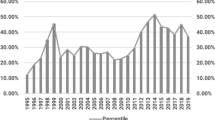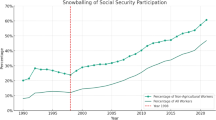Abstract
This paper introduces quality of government rather than regime type as dependent variable in studies of political effects of natural resources. It consists of two parts. First, it argues for an effect of fiscal dependency of oil and gas rents on quality of government. Second, it finds significant, negative effects of oil and gas rent dependency on three empirical indicators of quality of government—low corruption, bureaucratic quality and legal impartiality—in a sample of 139 states in the period 1984–2006. The results hold for inclusion of control variables such as regime type, income, region and religion.
Similar content being viewed by others
References
Acemoglu D, Robinson JA (2006) Economic origins of dictatorship and democracy. Cambridge University Press, Cambridge
Ades A, Di Tella R (1999) Rents, competition, and corruption. Am Econ Rev 89(4): 982–993
Beblawi H (1990) The Rentier State in the Arab World. In: Luciani G (ed) The Arab State. Routledge, London, pp 85–98
Beck N, Katz JN (2001) Time-series–cross-section data: what have we learned in the past few years?. Annu Rev Polit Sci 4: 271–293
Bolt K, Matete M, Clemens M (2002) Manual for calculating adjusted net savings. Environment Department, World Bank [Online]. Available: http://siteresources.worldbank.org/INTEEI/1105643-1115814965717/20486606/Savingsmanual2002.pdf
Bräutigam D (2008) Introduction: taxation and state-building in developing countries. In: Bräutigam D, Fjeldstad O.-H, Moore M (eds) Taxation and state-building in developing countries. capacity and consent. Cambridge University Press, Cambridge, pp 1–33
Chaudry KA (1997) The price of wealth: economies and institutions in the Middle East. Cornell University Press, Ithaca
Collier P, Hoeffler A (2005) Democracy and resource rents, GPRG-WPS-016. Global Poverty Research Group, Oxford
Dahlström C et al (2009) Bureaucracy, politics and corruption. Paper presented at the Midwest Political Science Association Annual National Conference, Chicago
Diamond L (2007) A quarter-century of promoting democracy. J Democr 18(4): 118–120
Diamond L (2008) The rule of law versus the big man. J Democr 19(2): 138–149
Dunning T (2008) Crude democracy. natural resource wealth and political regimes. Cambridge University Press, Cambridge
Easterly W (2002) Inequality does cause Underdevelopment: new evidence from commodity endowment, middle class share and other determinants of per capita income. Working Paper number 1, Center for Global Development, Washington, DC
Haber S, Menaldo V Do natural resources fuel authoritarianism? A reappraisal of the resource curse. Am Polit Sci Rev (forthcoming)
Hadenius A, Teorell J (2005) Assessing alternative indices of democracy. Concepts & Methods Working Papers 6, IPSA [Online]. Available: http://www.concepts-methods.org/working_papers/20050812_16_PC%206%20Hadenius%20&%20Teorell.pdf
Hamilton K, Clemens M (1999) Genuine savings rates in developing countries. World Bank Econ Rev 13(2): 333–356
Herb M (2005) No representation without taxation? Rents, development and democracy. Comp Polit 37(3): 297–317
Heston A et al (2006) Penn world table data set. Version 6.2
Humphreys M et al (2007) Future directions for the management of natural resources. In: Humphreys M, Sachs JD, Stiglitz JE (eds) Escaping the resource curse. Columbia University Press, New York, pp 322–336
Isham J et al (2005) The varieties of resource experience: natural resource export structures and the political economy of economic growth. World Bank Econ Rev 19(2): 141–174
Jensen N, Wantchekon L (2004) Resource wealth and political regimes in Africa. Comp Polit Stud 37(7): 816–884
Kaldor, M (ed) et al (2007) Oil wars. Pluto Press, London
Karl TL (1997) The paradox of plenty. Oil booms and petro-states. University of California Press, Berkeley
Karl TL (1999) The perils of the petro-state: reflections on the paradox of plenty. J Int Aff 53(1): 31–48
Kauffmann D et al (2008) Governance matters VII: governance indicators for 1996–2007. World Bank Policy Research Working Paper Series
Kolstad I, Wiig A (2009) Is transparency the key to reducing corruption in resource-rich countries?. World Dev 37(3): 521–532
La Porta R et al (1999) The quality of government. J Law Econ Organ 15(1): 222–279
Le TM (2007) Combating corruption in revenue administration. In: Campos JE, Pradhan S (eds) The many faces of corruption. Tracking vulnerabilities at the sector level. The World Bank, Washington, DC, pp 335–338
Leite C, Weidman J (1999) Does mother nature corrupt? Natural resources, corruption and economic growth. IMF Working Paper (85)
Levi M (1988) Of rule and revenue. University of California Press, London
Lindberg SI (2009) Byzantine complexity. Making sense of accountability. Political Concepts. Committee on Concepts and Methods Working Paper Series. University of Florida, Gainesville
McPherson C, MacSearraigh S (2007) Corruption in the petroleum sector. In: Campos JE, Pradhan S (eds) The many faces of corruption. Tracking vulnerabilities at the sector level. The World Bank, Washington, DC, pp 191–220
Mehlum H et al (2006) Institutions and the resource curse. Econ J 116(508): 1–20
Moore M (2004) Revenues, state formation, and the quality of governance in developing countries. Int Polit Sci Rev 25(3): 297–319
Moore M (2007) How does taxation affect the quality of governance? Working Paper (280). Institute of Development Studies
Morrison KM (2009) Oil, nontax revenue, and the redistributional foundations of regime stability. Int Organ 63(Winter): 107–138
Omgba LD (2009) On the duration of political power in Africa: the role of oil rents. Comp Polit Stud 42(3): 416–436
Pellegrini L, Gerlagh R (2008) Causes of corruption: a survey of cross-country analyses and extended results. Econ Gov 9: 245–263
Persson A (2008) The institutional sources of statehood. Assimilation, multiculturalism and taxation in Sub-Saharan Africa. Department of Political Science, University of Gothenburg, Gothenburg
PRS (2008) International country risk guide. The PRS Group [Online]. Available: http://www.prsgroup.com
Rajkumar AS, Swaroop V (2008) Public spending and outcomes: does governance matter?. J Dev Econ 86: 96–111
Rauch JE, Evans PB (2000) Bureaucratic structure and bureaucratic performance in less developed countries. J Public Econ 75(1): 49–71
Robinson JA et al (2006) Political foundations of the resource curse. J Dev Econ 79: 447–468
Rose-Ackerman S (2004). The challenge of poor governance and corruption. Copenhagen Consensus Challenge Paper [Online]. Available: http://www.copenhagenconsensus.com/Files/Filer/CC/Papers/Governance_and_Corruption_300404_(0.7MB_version).pdf
Ross ML (2001) Does oil hinder democracy?. World Polit 53(3): 61–325
Ross ML (2008) But seriously: does oil really hinder democracy? UCLA, Department of Political Science (unpublished draft)
Rosser A (2006) The political economy of the resource curse: a literature survey. IDS Working Paper, no. 268. Institute of Development Studies, Brighton
Rothstein B, Teorell J (2008) What is quality of government? A theory of impartial government institutions. Gov Int J Policy Adm Inst 21(2): 165–190
Sachs JD, Warner AM (1995) Natural resource abundance and economic growth. Working Paper No. 5398; NBER Working Paper Series
Shaxon N (2007) Oil, corruption and the resource curse. Int Aff 83(6): 1123–1140
Smith B (2004) Oil wealth and regime survival in the developing world, 1960–1999. Am J Polit Sci 48(2): 232–246
Sokoloff KL, Engerman SL (2000) History lessons: institutions, factor endowments, and paths of development in the new world. J Econ Perspect 14(3): 217–232
Stimson JA (1985) Regression in space and time: a statistical essay. Am J Polit Sci 29(4): 914–947
Tavits M (2008) Representation, corruption and subjective well-being. Comp Polit Stud 41(12): 1607–1630
Teorell J (2007) Corruption as an institution: rethinking the nature and origins of the grabbing hand. QoG Working Paper Series. The Quality of Government Institute at the University of Gothenburg, Gothenburg
Teorell J (2010) Determinants of democratization. explaining regime change in the world 1972–2002. Cambridge University Press, Cambridge
Teorell J et al (2008) The quality of government dataset, version 15 May 08. The Quality of Government Institute at the University of Gothenburg, Gothenburg
Tornell A, Lane PR (1999) The voracity effect. Am Econ Rev 89(1): 22–46
Torvik R (2002) Natural resources, rent seeking and welfare. J Dev Econ 67: 455–470
Treisman D (2007) What have we learned about the casues of corruption from ten years of cross-national empirical research?. Annu Rev Polit Sci 10: 44–211
Ulfelder J (2007) Natural-resource wealth and the survival of autocracy. Comp Polit Stud 40(8): 995–1018
Uslaner EM (2008) Corruption, inequality and the rule of law. Cambridge University Press, Cambridge
Van Rijckeghem C, Weder B (2001) Bureaucratic corruption and the rate of temptation: do wages in the civil servide affect corruption, and by how much?. J Dev Econ 65: 307–331
Wooldridge JM (2002) Econometric analysis of cross section and panel data. MIT Press, Cambridge
World Bank (2008) World Bank list of economies [Online]. Available: http://go.worldbank.org/K2CKM78CC0
Wright J (2008) Do authoritarian institutions constrain? How legislatures affect economic growth and investment. Am J Polit Sci 52(2): 322–343
You J, Khagram S (2005) A comparative study of inequality and corruption. Am Sociol Rev 70(February): 136–157
Author information
Authors and Affiliations
Corresponding author
Rights and permissions
About this article
Cite this article
Anthonsen, M., Löfgren, Å., Nilsson, K. et al. Effects of rent dependency on quality of government. Econ Gov 13, 145–168 (2012). https://doi.org/10.1007/s10101-011-0105-3
Received:
Accepted:
Published:
Issue Date:
DOI: https://doi.org/10.1007/s10101-011-0105-3




